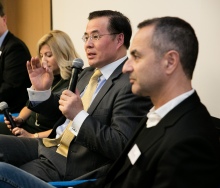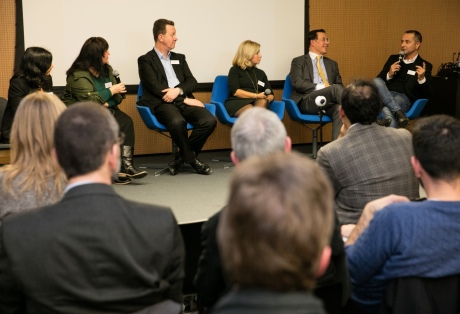Robots vs Humanity
by Jo Seed

Professor Guang-Zhong Yang, Co-Director of the Hamlyn Centre for Robotic Surgery, debating robots vs humanity at Google campus last week.
The Hamlyn Centre for Robotic Surgery participate in a debate about robots and ethics organised by the CHIRON project.
Should robots have faces? Can you fall in love with a robot? Will robots rule the future? These are some of the questions that were approached at last Thursday 1st December at ‘Robots vs Humanity’, an event organised by the CHIRON project.
The event, held at Google Campus in London, saw people from many industries come together to think about and debate some of the biggest issues facing our society and future. Rich Walker, MD of Shadow Robot chaired the panel, which saw the speakers weigh in on questions tweeted in by the audience throughout the six talks.
Among the speakers were Patrick Levy Rosenthal, CEO of Emoshape who introduced his innovative new software which endows robots with the ability to emulate human emotion. Controversy followed not long after with Kathleen Richardson, Director of the Campaign Against Sex Robots speaking about society and her opposition to sex robots.
Also speaking at the event were psychologists and psychiatrists, Dr Tom Pennybacker & Dr Elena Tourani of the Chelsea Psychology Clinic and Richard Graham of the Tavistock and Portman, who weighed in on issues surrounding attachment, child development and love.
 Meanwhile, engineers, Dr Praminda Caleb Solly, Associate Professor at UWE Bristol and Professor Guang-Zhong Yang, Co-Founder of Imperial’s Hamlyn Centre, explored exciting developments in the robotics world and spoke about some of their ground-breaking research to date.
Meanwhile, engineers, Dr Praminda Caleb Solly, Associate Professor at UWE Bristol and Professor Guang-Zhong Yang, Co-Founder of Imperial’s Hamlyn Centre, explored exciting developments in the robotics world and spoke about some of their ground-breaking research to date.
Praminda, who recently won STEM woman of the year at the RWOTY awards 2016, spoke about assistive technology and care robots. She was keen to put across the idea that robots were not being made to replace carers, merely to assist them. She said:
“The work in the BRL involves understanding how people and robots can interact intuitively, safely and effectively; designing and testing robots that will be acceptable and enjoyable to use, and ensuring that the technology is developed being mindful of ethical and cultural issues.”
“Assistive technologies, such as smart home environments, integrated sensors and assistive robotics, are recognised as important tools in helping older people improve their quality of life and live independently for longer. Current research is looking into a range of different ways in which robots might be used, such as assisting older adults with age related disabilities and long term conditions, and their carers, in daily tasks, to enable independent living and active ageing.”
However, not everyone was as positive about these advances in technology as Dr Caleb-Solly. Kathleen Richardson who is also author of An Anthropology of Robots and AI: Annihilation Anxiety and Machines said: “I am extremely worried about the impact on human relationships, as the idea that humans are optional – that you can have all your needs met by a machine – is not true.”
“In my previous research on autism I looked at how human beings make attachments and what happens if they don’t make attachments with other human beings.”
“Machines are very good at doing work and going to places that we cannot go to, like outer space, so they definitely have a role to play, but they cannot do what people do – they cannot do intimacy. It is not possible but we are increasingly being told it is,” she added.
Sinéad Nolan, Research and Communications Office for the CHIRON project who organised the event explained why she wanted people to have this debate.
“I think people should be discussing these issues. We are on the edge of one of the biggest changes in society. Technology is moving forward and people are wondering where it is going – where will we be in 30 years’ time? What will that change mean for us, and what will it mean for our society and our happiness?
“Although I agree that 'Robots vs Humanity' does sound a bit like a battle, we hoped the outcome for the event would be overall one of positivity and it definitely was. The feedback from the event has been excellent, with people saying it was one of the best events of its kind that they have ever attended.
“While we initially invited people to think of it a black and white issue, I think people left with a much more well-rounded view of how assistive technology and robots can help further our society in the future.”

Article text (excluding photos or graphics) © Imperial College London.
Photos and graphics subject to third party copyright used with permission or © Imperial College London.
Reporter
Jo Seed
Institute of Global Health Innovation